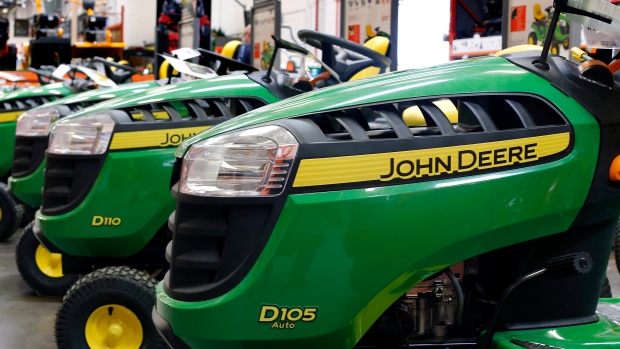Mar 20, 2018
Deere worried about retaliation against U.S. agriculture
, Bloomberg News

Deere & Co., the world’s largest maker of agricultural equipment, is concerned that rising trade tensions between the U.S. and other countries could affect sales of its signature green-and-yellow machinery.
While U.S. tariffs on imports of steel and aluminum will have a financial impact on the company, Deere is "much more worried" about possible trade retaliation targeting American agricultural products, Chief Executive Officer Sam Allen said.
"If China no longer buys U.S. soybeans or Mexico no longer buys U.S. corn, that would be really bad for our customers and that would be much more impactful on us," he said Tuesday in an interview at a company factory in Indaiatuba in Sao Paulo state, Brazil.
About one-third of U.S. agriculture is exported, Allen said. That trade flow could be in jeopardy if President Donald Trump follows through on repeated threats to quit the North American Free Trade Agreement, or if China imposes tariffs or quotas.
EMERGING RECOVERY
Any curbs on U.S. export earnings risk stifling a rebound in farmers’ incomes just as signs emerge of a recovery in agricultural commodity prices.
"After four years of record harvests, for the first time we’re seeing a potential reduction" in supply as a result of Argentina’s drought,” Allen said. "We can already see global grain reserves going down and they don’t have to go down much further for commodity prices to go up."
As for the metals used to manufacture Deere’s machines, the import tariff is concerning because American mills will be able to increase prices significantly, Allen said, adding that steel could rise by roughly 30 per cent in a short period of time. Still, it won’t be possible to asses the cost impact until the U.S. government provides more details on the tax rules to see if countries such as Canada and Mexico are affected, he said.
Without a trade war, agricultural-equipment demand may continue to rise as farmers replace old machines, he said. In the U.S., machinery sales should remain at current levels for the next four or five years in the absence of better price conditions, he added.
Latin America machinery sales are still seen as somewhere between being flat and gaining as much as 5 per cent this year, he also said. Falling Argentine demand will offset potential gains in Brazil, he said.



